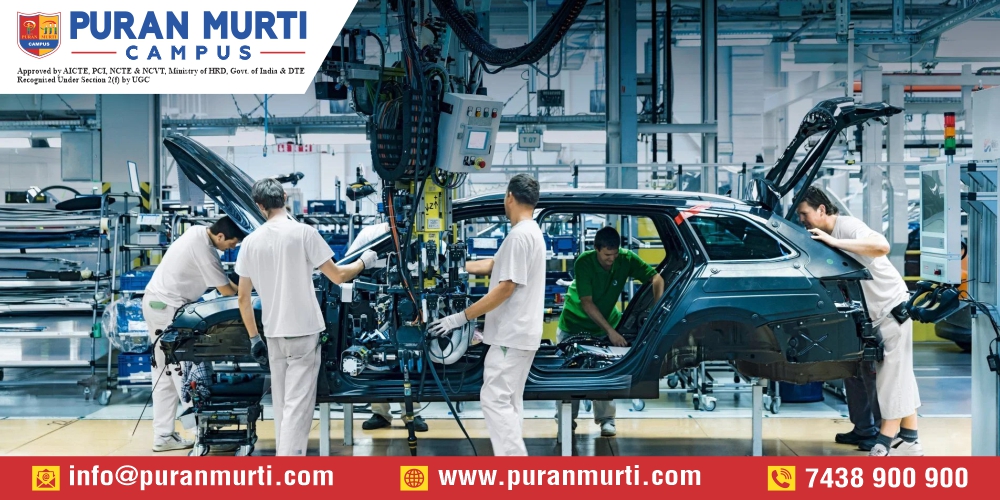From Classroom to Workshop: Diploma in Automobile Engineering
Posted on : 14 June, 2024 2:34 pm
Introduction
- The Diploma in Automobile Engineering bridges the gap between theoretical knowledge and practical application. This program equips students with a solid foundation in automobile mechanics, design, and technology while emphasizing hands-on training in state-of-the-art workshops. By combining classroom instruction with real-world practice, students gain valuable skills essential for the automotive industry. This comprehensive approach not only enhances their technical expertise but also prepares them for the dynamic challenges of the field, ensuring they are well-equipped to innovate and excel in their careers.
Understanding the Diploma in Automobile Engineering Program
- The Diploma in Automobile Engineering program provides a comprehensive education in automotive mechanics, design, and technology. It combines theoretical coursework with practical training, covering subjects such as engine systems, vehicle dynamics, and automotive electronics. This program prepares students for various roles in the automotive industry, emphasizing hands-on experience to develop the skills needed for a successful career.
The Transition from Classroom to Workshop
- The transition from classroom to workshop in a Diploma in Automobile Engineering program is crucial for skill development. Students move from theoretical learning to practical application, gaining hands-on experience with automotive systems and tools. This phase ensures they understand real-world mechanics, enhancing their technical abilities and preparing them for industry demands.
Core Practical Skills Developed
- In a Diploma in Automobile Engineering program, students develop core practical skills such as engine diagnostics, vehicle maintenance, and repair techniques. They learn to use specialized tools and equipment, understand automotive electronics, and perform safety inspections. These skills are essential for troubleshooting and ensuring vehicles operate efficiently and safely.
Types of Workshops and Training Facilities
- Types of workshops and training facilities in a Diploma in Automobile Engineering program include engine and transmission labs, automotive electronics workshops, and vehicle diagnostics centers. These facilities are equipped with modern tools and machinery, allowing students to gain hands-on experience in real-world scenarios. Additionally, simulation labs and computer-aided design (CAD) studios enhance their technical skills and understanding.
Challenges in Practical Training
- Practical training in a Diploma in Automobile Engineering program poses several challenges, including the need for up-to-date equipment, safety risks during hands-on activities, and the requirement for skilled instructors. Additionally, students must balance theoretical knowledge with practical skills, often under time constraints. Adapting to rapidly changing automotive technologies can also be demanding for both students and educators.
Future Prospects and Career Opportunities
- Graduates of a Diploma in Automobile Engineering have diverse career opportunities, including roles as automotive technicians, service advisors, quality control inspectors, and production supervisors. They can work in automotive manufacturing, maintenance, and repair facilities, or join racing teams. With experience, they may advance to managerial positions or specialize further through additional certifications and training.
The Value of Hands-On Experience
- Hands-on experience is invaluable in Diploma in Automobile Engineering, equipping students with practical skills crucial for the automotive industry. It bridges the gap between theory and application, preparing graduates for diverse career paths. Beyond technical proficiency, this experiential learning fosters problem-solving abilities and enhances employability. Employers value candidates who can apply knowledge in real-world settings, ensuring graduates are well-positioned for success.
Conclusion
- In conclusion, a Diploma in Automobile Engineering offers a comprehensive blend of theoretical knowledge and practical skills. This hands-on experience is crucial for preparing students for the dynamic automotive industry. The program equips graduates with the technical proficiency, problem-solving abilities, and real-world experience that employers highly value. As the automotive field continues to evolve, the skills and knowledge gained through this diploma ensure that graduates are well-prepared to innovate and excel in various career paths, making a significant impact in the industry.

